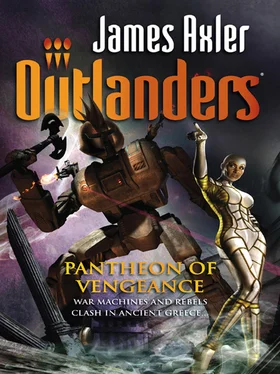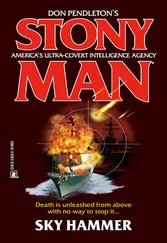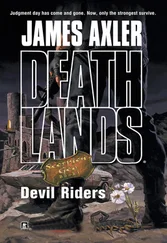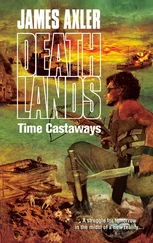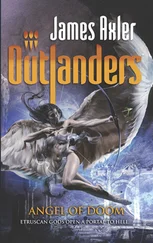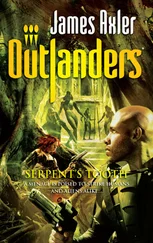A lone Nephilhim sighted down its forearm…
Grant’s Sin Eater launched into his grasp, his finger hooking the trigger on the draw. The lightning reflex movement enabled the former Magistrate to pump a 240-grain bullet into the Annunaki’s skull, an explosion of released pressure blossoming its head, leathery hide peeled back to resemble grisly flower petals. The dying drone’s ASP blast missed Are5 by yards, destructive energy dissipating into the night sky.
“Great shot!” Are5 complimented.
“Nice improvisation,” Grant returned.
Two Nephilhim sought to avenge their decapitated ally, their ASPs vomiting writhing tendrils of yellowish lightning at Grant and the robot, the blasters tearing into the earth around Grant’s improvised foxhole and driving Are5 deeper behind his ever-shrinking boulder. Grant winced as a spark sizzling off the main bolt singed his biceps.
“This shit did not happen when the bad guys just had fucking guns like the rest of us!”


www.mirabooks.co.uk
Special thanks to Doug Wojtowicz for his contribution to this work.
I do not love the bright sword for its sharpness, nor the arrow for its swiftness, nor the warrior for his glory. I love only that which they defend.
—J. R. R. Tolkien
The Road to Outlands—
From Secret Government Files to the Future
Almost two hundred years after the global holocaust, Kane, a former Magistrate of Cobaltville, often thought the world had been lucky to survive at all after a nuclear device detonated in the Russian embassy in Washington, D.C. The aftermath—forever known as skydark—reshaped continents and turned civilization into ashes.
Nearly depopulated, America became the Deathlands—poisoned by radiation, home to chaos and mutated life forms. Feudal rule reappeared in the form of baronies, while remote outposts clung to a brutish existence.
What eventually helped shape this wasteland were the redoubts, the secret preholocaust military installations with stores of weapons, and the home of gateways, the locational matter-transfer facilities. Some of the redoubts hid clues that had once fed wild theories of government cover-ups and alien visitations.
Rearmed from redoubt stockpiles, the barons consolidated their power and reclaimed technology for the villes. Their power, supported by some invisible authority, extended beyond their fortified walls to what was now called the Outlands. It was here that the rootstock of humanity survived, living with hellzones and chemical storms, hounded by Magistrates.
In the villes, rigid laws were enforced—to atone for the sins of the past and prepare the way for a better future. That was the barons’ public credo and their right-to-rule.
Kane, along with friend and fellow Magistrate Grant, had upheld that claim until a fateful Outlands expedition. A displaced piece of technology…a question to a keeper of the archives…a vague clue about alien masters—and their world shifted radically. Suddenly, Brigid Baptiste, the archivist, faced summary execution, and Grant a quick termination. For Kane there was forgiveness if he pledged his unquestioning allegiance to Baron Cobalt and his unknown masters and abandoned his friends.
But that allegiance would make him support a mysterious and alien power and deny loyalty and friends. Then what else was there?
Kane had been brought up solely to serve the ville. Brigid’s only link with her family was her mother’s red-gold hair, green eyes and supple form. Grant’s clues to his lineage were his ebony skin and powerful physique. But Domi, she of the white hair, was an Outlander pressed into sexual servitude in Cobaltville. She at least knew her roots and was a reminder to the exiles that the outcasts belonged in the human family.
Parents, friends, community—the very rootedness of humanity was denied. With no continuity, there was no forward momentum to the future. And that was the crux—when Kane began to wonder if there was a future.
For Kane, it wouldn’t do. So the only way was out—way, way out.
After their escape, they found shelter at the forgotten Cerberus redoubt headed by Lakesh, a scientist, Cobaltville’s head archivist, and secret opponent of the barons.
With their past turned into a lie, their future threatened, only one thing was left to give meaning to the outcasts. The hunger for freedom, the will to resist the hostile influences. And perhaps, by opposing, end them.
Chapter 1
Chapter 2
Chapter 3
Chapter 4
Chapter 5
Chapter 6
Chapter 7
Chapter 8
Chapter 9
Chapter 10
Chapter 11
Chapter 12
Chapter 13
Chapter 14
Chapter 15
Chapter 16
Chapter 17
Chapter 18
Chapter 19
Chapter 20
Chapter 21
Epilogue
Artem15’s flat treaded, semiclawed metal foot sank into the hillside with all the ponderous weight of her three-thousand-pound, clockwork-geared frame. The robot’s pace seemed to be leisurely as she topped the small swell in the terrain, but it was just the illusion cast by her towering fifteen-foot height. Each swing of her long, mechanized legs was accompanied by the soft, melodic whistle of polished joints grinding against each other.
Artem15 was a decidedly female construct. There was no disguising her feminine breastplate, contrasting with the masculine-sculpted copper torsos of her fellow mechanically suited warriors. Her head, a camera-laden module with ruby-red optics placed where the eyes would be in a bronze-forged representation of a woman’s face, was hunched between shoulder-mounted guns. A mane of glimmering golden ribbons of polished and colored steel wool hung like real hair.
Diana Pantopoulos, who piloted the one-and-a-half-ton mobile war suit, was one of the elite. Thus she had been rewarded with the identity Artem15. A mere combat drone bore a singular red ID number painted onto a coppery simulation of a pectoral muscle. The rank-and-file drone pilots strode into battle with ID stencils, not names drawn from the gods of ancient Greece. The mane of Diana Pantopoulos’s suit glimmered like fire in the sunset, two fat, braided ropes of gold-polished cable falling forward to provide her metallic breasts a modicum of modesty, keeping the Artem15 armor from flashing naked breasts on the battlefield. Though the war suit pilot called the metals that made up the armor copper and bronze, they weren’t. They were far older materials, crafted by beings whom Hera Olympiad had identified as the gods themselves. The specifics really didn’t matter to Diana, because inside the robot walker, she was not just another subject of the New Olympian nation state; she was Artem15, the Artemis of the third millennium.
She swiveled her camera head to the left, spying Are5, with his green copper Mohawk jutting from forehead to the back of his neck, as sharp and aggressive as a circular-saw blade. A glance to the right showed Apo110, his burnished yellow locks a more masculine rendition of her own red-gold wig.
The three of them were Hera’s representatives of the pantheon known as Strike Force Olympus. The three towered twice as tall as a man, and they bristled with cannons and wielded massive manipulator claws that could fold into fists easily capable of crushing a boulder. The god-themed robot warriors had their own weapons, based on their larger-than-life inspirations, while the robot drones that they led were styled after helmeted Spartan warriors; one forearm was concealed under a buckler five feet in diameter, while the other arm ended in a spike-knuckled claw that could fold into a two-foot-wide monster fist.
Читать дальше
